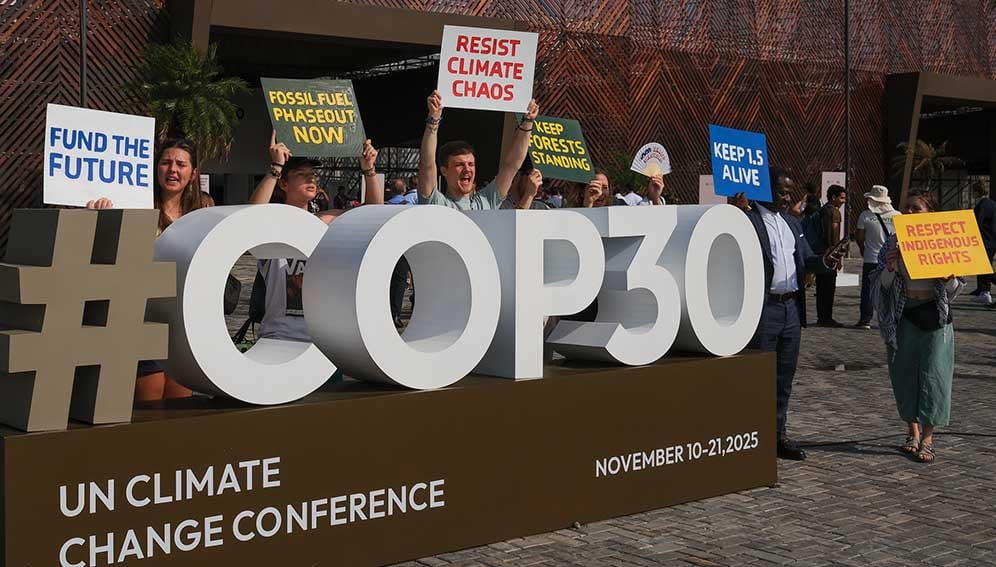24/11/25
COP30 clinches climate finance, falters on fossil fuels

By: Hadeer Elhadary
Send to a friend
The details you provide on this page will not be used to send unsolicited email, and will not be sold to a 3rd party. See privacy policy.
[SciDev.Net] The UN climate summit closed with advocates warning of a dangerous disconnect as countries moved to triple adaptation finance for poor nations while making no progress on curbing fossil fuels, a gap they sharply criticised in Belém, Brazil.
After days of fraught negotiations, multiple failed drafts, and an emergency shutdown, the UN summit closed on Saturday (22 November) with an agreement to mobilise US$1.3 trillion annually by 2035 to support global climate action.
The package includes pledges to double adaptation finance for vulnerable countries by 2025, triple it by 2035, operationalise the loss and damage fund, and launch two new tools—the Global Implementation Accelerator and Belém Mission to 1.5°C—aimed at strengthening delivery of climate goals.
The talks were interrupted when a fire in one of the pavilions used for the conference forced the temporary evacuation of some buildings on Thursday (20 November), with several people treated for smoke inhalation.
Aline Khoury, a project coordinator at Brazilian international relations think tank CEBRI who attended the summit, said the outcomes were “mixed but meaningful”.
She told SciDev.Net: “On the one hand, COP30 boosted financing for vulnerable countries particularly on forests and adaptation […] On the other hand, it was not fully able to provide the necessary progress regarding the most contentious issues of fossil fuels.”
Fossil fuel roadmap
More than 80 countries backed Brazil’s proposal for a global roadmap to phase out fossil fuels. But in a last-minute shift, the final text reverted to the COP28 “UAE Consensus”, which called for “transitioning away from fossil fuels”, without offering timelines or mechanisms.
Fossil fuel discussions will continue through an independent process leading up to COP31, amid what Khoury describes as “deep geopolitical rifts”.
Ahead of the final session, Brazilian scientist Carlos Nobre warned that fossil fuel use must reach zero between 2040 and 2045 to avoid catastrophic temperature rises of 2.5 degrees Celsius above pre-industrial levels by mid-century. Exceeding this window, he said, would mean the near-total loss of coral reefs, collapse of the Amazon rainforest, and accelerated melting of the Greenland ice sheet.
Meanwhile, the UN Environment Programme’s Emissions Gap Report 2025 paints a stark picture: even full implementation of current national climate plans would result in 2.3 to 2.5 degrees Celsius of warming, while current policies point to 2.8 degrees.
Emissions must fall 35 per cent by 2035 from 2019 levels to stay on a two degrees Celsius pathway and 55 per cent for 1.5 degrees, according to the report. It warns a temporary overshoot of 1.5 degrees is “very likely” within the next decade.
Adaptation under pressure
Adaptation was one of the most debated issues at COP30, particularly for countries already facing severe climate impacts. The UNEP Adaptation Gap Report 2025 estimates that vulnerable countries will need between up to US$365 billion a year by 2035.

Indigenous groups at COP30 in Brazil. Advocates call for practical mechanisms to ensure direct access to climate finance for indigenous communities. Copyright: Kiara Worth/UN Climate Change (CC BY-NC-SA 4.0).
By contrast, international public adaptation finance reached just US$26 billion in 2023, down from US$28 billion the previous year.
Ghiwa Nakat, executive director of Greenpeace Middle East and North Africa, welcomed the decision to triple adaptation finance, but warned that the overall adaptation package had weakened.
She told SciDev.Net: “The pledge […] will only be effective if it is delivered as grant-based public finance, not loans or private finance, and if it provides predictable, reliable funding to strengthen crops, water systems, and early-warning capacities.”
She said current outcomes, including the US$300 billion climate finance goal agreed at COP29 in Baku, Azerbaijan “fall short on both quality and quantity”.
It is unclear whether the COP30 decision to convene a high-level ministerial roundtable will lead to a clear process for implementation, she added.
She stressed that practical mechanisms must ensure direct access for indigenous peoples and local communities, integrate adaptation, mitigation and loss and damage, and be supported by “progressive tax reforms and holding polluters accountable”.
Climate finance gap
Despite the gaps, climate investment is expanding rapidly. The Global Landscape of Climate Finance 2025 report, published by the Climate Policy Initiative, shows global climate finance reached US$1.9 trillion in 2023, more than double 2020 levels.
Lead author Baysa Naran told SciDev.Net that emerging markets and developing economies were “stepping into leadership roles” and embracing climate investment and adaptation strategies.
However, Naran noted that fiscal constraints and high capital costs mean climate finance is growing more slowly in developing economies than the global average.
“This is why it is important that international public finance needs to—at the very least—fulfil the pledge of US$300 billion by 2035, agreed in Baku,” he said.
“Given the imminent threat and challenge climate change is already posing, adaptation and resilience need to be mainstreamed in all aspects of human development and natural capital systems,” Naran added.
This piece was produced by SciDev.Net’s global desk.


